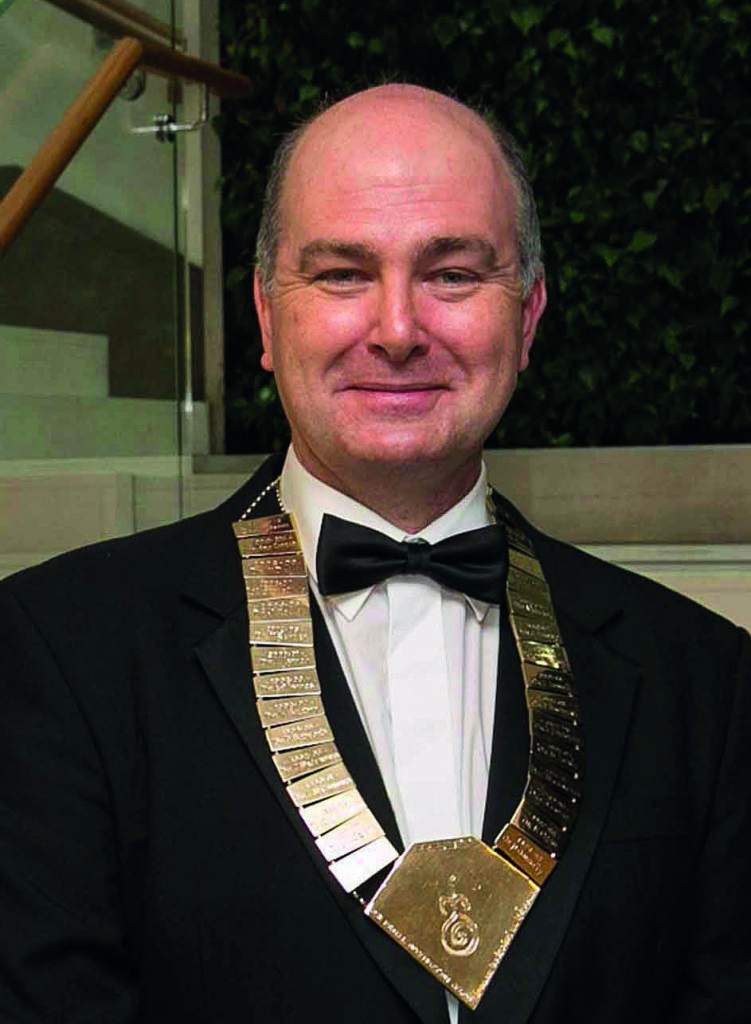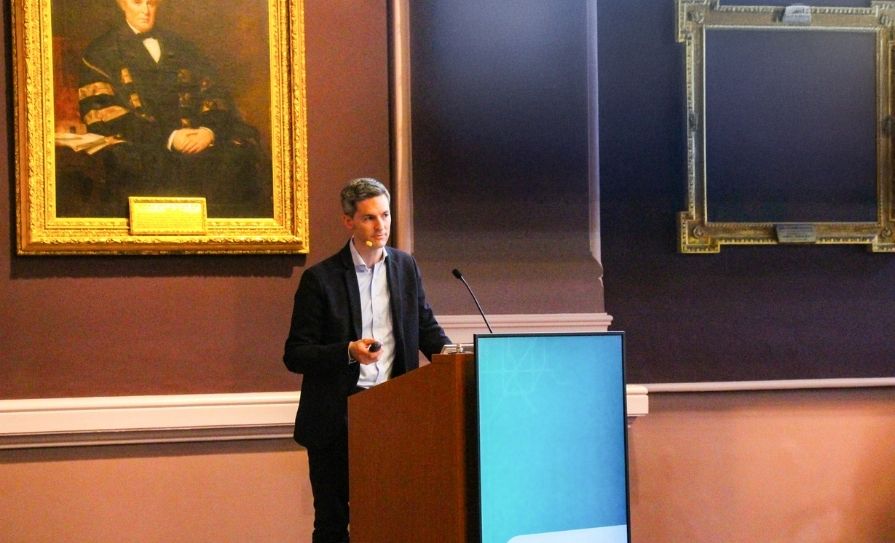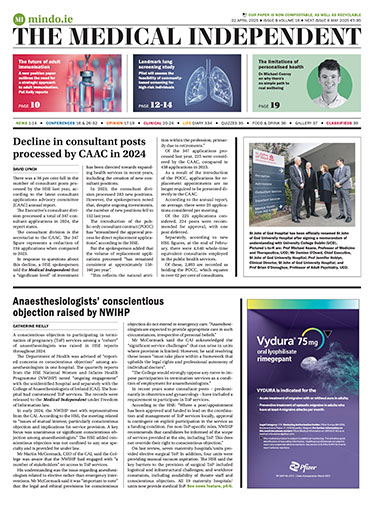Catherine Reilly
Problems recruiting and retaining hospital doctors has led to dependency on non-permanent staff, some of whom lack appropriate experience and qualifications and put patient safety at risk. Catherine Reilly reports
“How could he have been awarded 55 out of 100 marks in respect of clinical, medical and diagnostic skills when his lack of those very skills was so obvious within days of his coming to work in the hospital?”
Judgement of Mr Justice Peter Kelly, President of the High Court, in the case of Medical Council and FCM, 7 November 2018.
The case of an SHO who lacked basic medical competencies, employed at University Maternity Hospital Limerick for a short period in 2018, was another alarm bell sounding on doctor recruitment.
In November, a written judgement from High Court President Mr Justice Peter Kelly stated that an interview process “worth its salt” would have demonstrated that the candidate did not know any cause of anaemia other than iron deficiency, or about the basic management of eclampsia, and thought a pulmonary embolus should be treated with aspirin.
Multidisciplinary team members had expressed “serious concerns” about the doctor’s competence “in basic medical tasks”, according to information in the judgement. Furthermore, SHO colleagues reported that they had witnessed “wild clinical ‘assessments’” involving no history or examination of patients.
After nine calendar days, the doctor was taken off clinical duties and two hospital consultants submitted complaints about him to the Medical Council.
Mr Justice Kelly granted the Council’s application for immediate suspension of this doctor’s registration and he underlined it was not an isolated case.
“Unfortunately, I have encountered other cases where registered medical practitioners with little knowledge of the basics of medicine are nonetheless recruited to work in the hospitals of this State,” warned Mr Justice Kelly, who opted to deliver the written judgement in open court due to the serious nature of his concerns.
The doctor in this case was a Nigerian citizen who qualified from a Romanian university in 2015, but was never registered to practise in either country. On his CV, he falsely described having been an SHO at the Royal Infirmary Hospital, Edinburgh, Scotland. He was never registered to practise medicine in the UK.
In October 2017, the doctor was registered in the general division of the Irish Medical Council. He apparently applied for every SHO job on the HSE’s website but was told he had not been shortlisted or did not have the required experience. However, he was placed fourth on a panel following an interview at Limerick, and when called to serve in the maternity hospital, his lack of competence was noticed within days.
Arising from the written judgement, the Medical Council’s CEO Mr Bill Prasifka sought a meeting with the then interim HSE Director General (DG) Mr John Connaghan to discuss the issues raised “as soon as possible”.
In a letter dated 8 November 2018, Mr Prasifka highlighted how the High Court President had publicly expressed “concerns regarding the recruitment and interview process utilised by the HSE in hiring”.

In response, Mr Connaghan requested Chief Clinical Officer Dr Colm Henry, Director of National Doctors Training and Planning Prof Frank Murray, and National Director of Human Resources Ms Rosarii Mannion to attend this meeting as his representation.
By press time, neither the HSE nor Medical Council had provided an update on the outcome of the planned meeting.
On the case involving the SHO at University Maternity Hospital Limerick, a Council spokesperson said: “The issue pertaining to the registration of the doctor in this matter related to automatic recognition provisions of the EU Directive 2005/36/EC (as amended). The requirements of the Directive require Council to automatically recognise a doctor who has qualified in an EU country, where they present a qualification which is listed in Annex V of the Directive.
“The Council has highlighted the concerns of the President of the High Court, related to the recruitment and interviewing processes of the HSE; a matter over which the Council has no jurisdiction.”
Service gaps
There has been growing dependency on doctors engaged on short-term contracts and via locum agencies to plug ever-increasing service gaps. While there are highly-competent doctors in temporary and locum roles, there are others who are poorly-qualified personnel and they pose risks to patients.
In 2016, Mr Justice Kelly expressed major concerns about how an NCHD, who mistook an ankle for an elbow in an x-ray during a teaching session, could have been employed in three Irish hospitals (Midland Regional Hospital, Portlaoise; Mayo University Hospital; and Galway University Hospital).
In this case, the judge upheld the Council’s decision to strike-off Dr Omar Hassan Khalafalla Mohamed. Mr Justice Kelly also wondered how he had managed to get on the medical register in the first instance.
On the ground, doctors say there is a lack of structure and supervision surrounding non-training NCHD posts, which are held by doctors of varying quality.
SHO Dr Ellen Newman is on a temporary contract, having decided to take time-out between intern year and basic specialist training. She is doing nine months of standalone posts before going to New Zealand and can share some interesting experiences in this regard.
“On interviewing for standalone posts, I can say there is a wide range on how intensively they question you, and some don’t talk through clinical scenarios, etc. Many are just to eyeball you and to work out why you’re not in Oz/on a scheme,” she told the Medical Independent (MI).
“I have also worked alongside plenty of temporary contract NCHDs. Many would be like me, going to travel or waiting to get on a scheme that’s tough to get on to. However, many would be ‘career regs’ or SHOs new to Ireland. And sadly, that’s where I see the most drastic difference.
“A huge component, I feel, is lack of structured teaching, supervision, or any formal induction, particularly as many start mid-year and not in traditional July. There are obvious issues that get ‘lost in translation’ so to speak — acronym use like CT TAP, IDDM, etc. But then there are less apparent factors that cause issues, like note-taking, and consultants do not pull these individuals aside to say ‘this is how you do x, this is the standard of treatment, the typical investigations’. And unfortunately, as an SHO, it is difficult to intervene with your senior/colleague for fear of stepping on toes or straining your working relationship.
“I also anecdotally note that communication with patients/family can be poor, or less frequent, and this can alter how good a patient feels their management has been, regardless of outcomes. And there is also trying to wrap your head around Fair Deal, HCP [home care packages], convalescence versus rehab, if the system you trained in didn’t have such concepts. At times lack of [clinical] knowledge is an issue, but this is far less prevalent than the other issues.
“Essentially, I think there’s a difference in the standard between scheme and non-scheme NCHDs, and this is most prevalent in doctors new to Ireland, or those who did not do any level of training here. But I do think a lot can be rectified by better training and supervision, which should be standardised, as obviously some consultants are more diligent and enthusiastic than others.”
Another NCHD, who preferred not to have their name published, commented: “When I was working in Cavan General Hospital [in 2016], there was a doctor on a contract — not locum — who was dangerous clinically, regularly. I spoke with his consultant, who acknowledged the poor standard but did not follow-up. I spoke with HR, who acknowledged the poor clinical standard. He had a dozen complaints from nursing staff. He continued in his post and moved on to another hospital. It was really shocking. I had to double-check everything he was doing out of concern for patients. I’ve experienced dangerous locums in every hospital I have worked in. I have flagged dangerous practice to consultants and HR, but nothing has ever happened.”
According to emergency medicine trainee Dr Mohammed Hamza, Ireland has the highest number of medical graduates (24.4 per 100,000) of all the OECD countries, yet is in the bottom half of the table in respect of numbers of doctors per 1,000 inhabitants.
“Why we lose 300 medical graduates a year to Australia alone was never a mystery to anyone, but Dr Niamh Humphries’s work for the Hospital Doctor Retention Motivation Project last year coloured in the picture. A system constantly under strain, which is ‘not functioning for the staff or for the patients’, can’t compete with greener, sunnier and more lucrative pastures for young graduates who aspire to some measure of quality-of-life.
“Then we have our new consultants who, since October 2012, have had to live with a 30 per cent pay reduction. That’s a lot of money, no matter how you cut it, and not only makes Ireland less and less competitive in the market for quality candidates for senior roles, but also less and less attractive to Irish graduates abroad thinking of returning to take up specialist posts. So, we have insufficient numbers of junior doctors, and we are compounding this with insufficient numbers of senior decision-makers.”
In this respect, temporary doctors are plugging the holes. Dr Hamza said if he was heading to work, particularly for a night shift, he would much rather be told “‘hey, we have a locum for the night, look after them’, rather than ‘hey, we’re down one tonight, buckle up!’”
“I’m not defending our reliance on locums here; far from it. It’s a short-term fix for a failure in long-term planning, and a very pricey one at that.”
Consultant appointments
Inappropriate appointments at consultant level have also been spotlighted by Mr Justice Kelly.
On 16 April 2018, the Council CEO Mr Prasifka wrote to the then HSE DG Mr Tony O’Brien about issues raised by Mr Justice Kelly regarding appointments of doctors to consultant posts who did not hold the necessary specialist qualifications.
The concerns arose following a Council application to the High Court to confirm its decision to cancel the registration of a doctor, who was appointed as a locum consultant radiologist at Cavan General Hospital in 2014, having been recruited by an agency. He worked at the hospital for three months.
Hospital management “became aware” that the doctor did not possess the necessary specialist qualifications for entry to the specialist division of the medical register, according to Mr Prasifka’s letter.
A review of the doctor’s reporting revealed “very significant shortcomings”. This doctor was found guilty of poor professional performance at a Council fitness to practise inquiry, “arising from, inter alia, his failure to identify tumours, strokes, ulcers and fractures”.
Mr Justice Kelly highlighted that the doctor was recruited as a consultant, despite not holding specialist registration; that Cavan General Hospital had not played any part in the doctor’s recruitment, which was managed exclusively by an agency; and that similar cases had come before him. The High Court President also queried the Council’s position on appointment of non-specialists to consultant posts, as well as what steps it was taking on this issue.
The Council was obliged to swear an affidavit on these matters later that month and needed the HSE’s “urgent assistance” in addressing these concerns. Mr Prasifka requested data on various points, including the number of practitioners employed as locum consultants in the last 12 months who did not hold specialist registration.
In this correspondence, Mr Prasifka made reference to the HSE report Towards Successful Consultant Recruitment, Appointment and Retention, published in February 2017. It stated that “significant risk issues arise from poor compliance by health service employers with national requirements regarding the creation and approval of non-permanent consultant posts”. The report found that the HSE was required to act “as a matter of urgency to enforce existing regulatory requirements and that sanctions are implemented for non-compliance with qualifications, to include funding”.
But the letter also referred to data already held by the Council, published in the Medical Workforce Intelligence Report, April 2016, which indicated that some 8.1 per cent of doctors registered in the general division were ‘hospital consultants’. This data relied on the accuracy of self-declarations and would include some doctors in private hospitals, noted Mr Prasifka.
According to HIQA, it raised the matter of these appointments with the HSE in August 2017, and subsequently.
There were 161 doctors with general registration in consultant posts in HSE/HSE-funded organisations as of 12 December 2018, according to the HSE, which has embarked on site visits in an attempt to address the situation.
‘Unattractive’ posts
The appointments of poorly or inappropriately qualified personnel is “all a symptom of the unattractiveness of posts in the Irish health service”, according to Consultant Haematologist Dr Gerard Crotty, Midland Regional Hospital, Tullamore, and a former President of the IHCA.
“The pay inequality for newly-appointed consultants is the major factor and is counterproductive; not actually saving money due to the need for expensive agency locums and the quality issues that can result.”
HSE acute hospitals and Community Healthcare Organisations (CHOs) spent €70 million on medical/dental agency staff last year to September and over €105 million in 2017 (see panel), according to figures released to Sinn Féin health spokesperson Deputy Louise O’Reilly following a parliamentary question.
IMO President Dr Peadar Gilligan, a Consultant in Emergency Medicine, Beaumont Hospital, told MI that this country’s reliance on temporary doctors is “very significant”.
“In fact, in the last 10 years, I cannot think of a time, in the hospital in which I work, that we haven’t had a significant locum requirement and I think that is replicated throughout the country.”
While there are “challenges” in specific areas and hospitals, noted Dr Gilligan, consultant recruitment is essentially a nationwide problem due to the 30 per cent pay cut for new entrants.
“And there is also a difficulty attracting people back to Ireland who have completed their training abroad, or who are specialists abroad, because of the under-resourcing of the system, with the result that we essentially have unfilled posts and to try and provide safe patient care, we are having to appoint people on temporary contracts or locum contracts, just to fill those posts.
“The reality is there are services that are not being provided because there isn’t a doctor available to perform those duties. So it really is very, very concerning to the medical profession that Ireland isn’t an attractive place to work in hospital medicine and indeed in primary care now, since the ‘financial emergency measures in the public interest’.
“The concern is that historically, we had the economic downturn and with that came essentially staff ceilings and they were used as a reason for failure to fill posts around the country. But then with the cuts that took place, we had a real challenge to recruit people, and then changes were made to the remuneration of people who were working in a locum capacity which made the UK a more attractive potential location. So the locum agencies have been telling me that they are finding it challenging to get enough doctors to meet the demands that are placed on them as locum agencies.”
Attracting and retaining doctors is a global issue. However, Dr Gilligan said it was “a particularly acute problem in Ireland”. He said there are now in excess of 500 consultant posts unfilled nationally, “in a country that already has less specialists than most of Western Europe”.
Asked if industrial action was ever more likely on the issue of the new-entrant salary, Dr Gilligan said “the frustration is growing to the point that that is becoming increasingly likely”.

Locum agencies
But what is the extent of consultant involvement in recruitment, especially for NCHDs? Can a locum agency be empowered by the HSE to undertake employment checks and would locums be assigned to a shift without an interview process involving clinicians?
MI contacted all of the locum agencies listed by the HSE as approved suppliers to discuss such matters, but none had responded by press time. Comment was also awaited from the HSE.
On such questions, Dr Gilligan commented: “Well, oftentimes, certainly for someone who is going to be in a locum post for a period of weeks or months, then most definitely an interview will have taken place to ensure the person is the right fit for the job. But locum positions arise on a daily basis around the country, by virtue of sick leave or by virtue of the fact that, as I say, there isn’t anyone in that post.
“So for a short-term locum, what can often happen is, the locum agency will identify that they have a doctor who they feel is appropriate, the medical administration in that hospital will vet the documentation and send the CV and references to the consultant who will review those, and make a decision as to whether that person is appropriate to fill the shift that has become available.
“So it can be a precarious arrangement, both from the point of view of the doctor providing the locum service and the hospital accepting the doctor in the locum service and is not ideal really, from the point of view of ongoing patient care provision… ”
On lack of mentoring and support for such doctors, Dr Gilligan said “the reality is that for someone who is coming in to fill maybe one shift… there is a huge service need already in place”.
Meanwhile, the State Claims Agency (SCA) said it had raised with the HSE the issue of consultants not on the specialist register, “as part of its normal interaction with the HSE concerning risk management issues and topics”. It added that “no discernible pattern has arisen, at this time, of adverse events related to individual clinicians not on the specialist register”.












Leave a Reply
You must be logged in to post a comment.